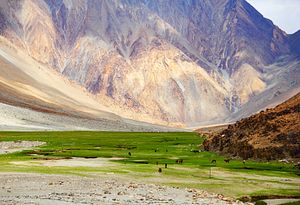A cordial handshake and a brief exchange of views between the Indian and Pakistani prime ministers on the sidelines of the Paris climate summit paved the way for ministerial level talks between the two countries, which took place almost a week later in Bangkok. This rare meeting between the National Security Advisors (NSA) of India and Pakistan, described as “candid, cordial and constructive,” only became public news in the form of a brief joint statement. In another significant development, Indian Foreign Minister Sushma Swaraj visited Pakistan to attend the Heart of Asia conference, which focuses on the Afghan conflict.
Eclipsing this all and in an unprecedented show of statesmanship, the Indian prime minister, Narendra Modi, briefly visited Pakistan where he met with his Pakistani counterpart in Lahore. Other high level bilateral engagements are in line: while cricket diplomacy is being discussed to further improve the ties, Modi is said to have confirmed his attendance for next year’s SAARC summit, which is set to take place in Pakistan.
This fast-paced reconciliation has even survived a terrorist attack on an Indian Air base in Pathankot and another attack on the Indian consulate in Mazar-i-Sharif, Afghanistan. While different media reports have confirmed that the attack at the Pathankot Air base was carried out by a Pakistani militant group, Jaish-e-Mohammed (JeM), another Kashmiri militant group, the United Jihad Council (UJC), has claimed responsibility for the attack.
Modi, who has previously responded to such attacks in a proactive manner, reacted calmly: he blamed “enemies of humanity” for the Pathankot attack while refraining from giving any statement on the Mazar-i-Sharif consulate incident.
One can see cooperation and calm emerging on both sides instead of confrontation. Reportedly, the Indian nationa security advisor has provided some credible leads to his Pakistani counterpart regarding the Pathankot Air Force base attackers. Pakistan has welcomed this and promised to take credible action.
On the face of it, this series of engagements seem largely to focus on issues of bilateral cooperation: both countries have also agreed to initiate a “comprehensive bilateral dialogue” instead of “composite dialogues.” In these dialogues, all outstanding issues – including Kashmir – will be discussed.
But this softening of attitudes between the two neighbors has regional connotations as well. India and Pakistan, while sometimes competing among themselves for influence in Afghanistan, also share some common interests there, primarily linked with regional security and trade. In the coming weeks, the security situation in Afghanistan is likely to receive more attention and cooperation from both of these counties.
Modi, while addressing the Afghan parliament last week, said: “We know that Afghanistan’s success will require the cooperation and support of each of its neighbors… that is why I hope that Pakistan will become a bridge between South Asia and Afghanistan and beyond.” One can argue that Modi’s surprise visit to Pakistan on his way back from Afghanistan was meant to shed away Pakistan’s long-held perception that India’s involvement in Afghanistan is a direct threat to Pakistan’s security.
If the Afghan conflict, which has recently escalated sharply, is to come to any resolution, it is vital that Pakistan and India support a single peace process rather than opposing each other as they have done traditionally. In this context, such a high level presence from the Indian side in the recent Heart of Asia meeting in Islamabad and Modi’s short visit to Lahore on his way back from Kabul are significant.
Pakistan’s counter-terrorism operations in the tribal regions along the Afghan border against the Taliban are bearing fruits and Islamabad is making efforts to push forward a regional plan for the reconciliation process to succeed in Afghanistan. This process includes India. Reportedly, Pakistan and Afghanistan have agreed to resume the stalled peace process, which is likely to begin in January.
There are other impulses driving a modus vivendi between India and Pakistan in Afghanistan. For India to fulfill its rapidly rising energy needs, tapping into Central Asian energy market is vital which will remain futile unless there is peace and stability in Afghanistan – a gateway between Central and South Asia. Pakistan has similar interests. Pakistani Prime Minister Nawaz Sharif visited Turkmenistan last week where he inaugurated the Turkmenistan-Afghanistan-Pakistan-India (TAPI) gas pipeline. Furthermore, India which has remained reluctant about any gas pipeline project crossing Pakistan, has also shown willingness to join the Afghanistan-Pakistan trade and transit agreement. Perhaps, in the coming months, we may see a new era of economic cooperation between India and Pakistan, which in due course will also benefit the security situation in the insurgency-riddled frontier regions of Afghanistan.
The NSA-level talks in Bangkok, the Heart of Asia conference in Islamabad, and Modi’s surprise visit to Lahore have without a doubt produced some of the most productive South Asian regional diplomacy in months. With security and economic interests at stake on all sides, one hopes that this engagement bears longevity.

































